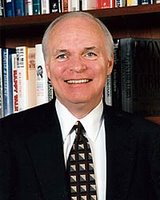1st Rule of Democracy: You have to keep tight control over what those damned TV cameras see. 2nd Rule: Um, Rome wasn't built in a day?
>
Our friend Al Kamen (OK, we don't actually know him, but we're sure that if we did, he'd be a great guy to, you know, hang out with) has roared into the new year with guns blazing in today's Washington Post "In the Loop" column. You should check it all out, but there are three items we can't resist passing on.
The first two have to do with the iron rule of the TV cameras, although in the first instance it turns out that there is something more powerful, namely a legislative house whose members would just as soon stay out of sight except on their own terms:
An 'Honest,' 'Open' House,
Where Cameras Can't Zoom Out
The House of Representatives is often called "the People's House." So wouldn't it be nifty if the "people" could see what was going on in their own house?
But those watching on TV really can't. Only tight camera shots of lawmakers speaking on the floor--or of the presiding officer in the chair--are allowed. The camera is not permitted to pan the chamber. Incoming Speaker Nancy Pelosi (Calif.) had promised that the Democrats would have "the most honest, most open and most ethical Congress in history."So Brian Lamb, the head of C-Span, which got the electronic eye into the House and Senate in the first place nearly three decades ago, thought this would be a great opportunity to improve coverage. (The GOP turned him down in 1985.)
He wrote Pelosi asking for more cameras, saying the current system "does a disservice to the institution and to the public." For example, the fixed camera means "you can never get a reaction shot" during a debate, he told us, so it "takes out of the experience any soul" or sense of the give-and-take.
Not so, Pelosi said in a Dec. 22 letter to Lamb. "I believe the dignity and decorum of the United States House of Representatives are best preserved by maintaining the current system of televised proceedings," she wrote.
"Dignity"? "Decorum"? In a place that folks such as Jim Traficant, Duke Cunningham and Mark Foley used to call home? Okay, she's obviously joking, but still. . . . As The Who sang years ago: "Meet the new boss, same as the old boss."
But the more usual reality is that what the camera wants, the camera gets, even if it means "papering" a state funeral:
Keep the Empty Seats Out of the ShotThere was a fine turnout yesterday at the National Cathedral for the funeral of former president Gerald R. Ford. Tickets were hard to come by, and latecomers were turned away. Even so, seems there were some empty seats.
Just before the service began, an usher approached a Loop colleague sitting in the cheap seats on the left, the seats where you really are better off watching the monitor if you want to see anything.
"Does anyone want to sit in the center section?" the usher asked. "We need 10 people" to fill in the crowd. So a group of people trooped to the rear of the center section, just in front of the Boy Scouts sitting in the last four rows, to watch from there.
And finally, who can resist a punch line like this?
GSA Earning a Few Admirers Out WestThe GSA's fame has spread across the country. This just in from the Austin American-Statesman: "It will be little comfort to anyone who has ever undergone the torture of a building project to know that bigger doesn't mean better--or easier. U.S. District Judge Lee Yeakel is learning a lot about government construction projects as he helps oversee the construction of the proposed federal courthouse. . . . He notes with a chuckle that he was advised that the U.S. General Services Administration--the agency in charge of getting the project built--has a motto: 'We're not happy until you're not happy.'"






0 Comments:
Post a Comment
<< Home